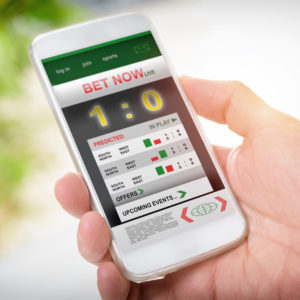Senators Chuck Schumer and Orrin Hatch announced plans in December to introduce bipartisan legislation that would regulate sports betting markets with new federal standards.
The bill is a response to the Supreme Court’s decision last May to strike down a federal law prohibiting commercial sports betting. Since then, state lawmakers have moved to deregulate betting markets, with a spate of laws likely to be enacted next year.
Discussion on the issue has centered on the debate that tends to accompany state lotteries and casinos more generally: Whether government regulation to hedge against the social costs of betting markets are justified in light of the benefits that a $150 billion industry can provide.
It is not surprising that cash-strapped legislatures facing no shortage of addiction-related public health challenges are focused on these issues.
Lost in the debate, however, is how the unique features of betting markets could transform the quality of our public discourse.
In his recent book “The Death of Expertise,” Naval War College professor Thomas Nichols argues that much of the public skepticism facing our institutions is driven by the fact that expert predictions and forecasts are in fact consistently off base. He cites a landmark 2005 study by University of Pennsylvania professor Philip Tetlock showing that the predictions of the average expert on political and economic issues fare little better than random guessing.
One reason experts are wrong so often is that we do not live in a culture of accountability when it comes to prediction. Pundits, academics and public intellectuals come to the fore through credentials incidental to forecasting skill. Even the vast majority of corporations and governments with billions at stake in their forecasts spend little analyzing forecasting accuracy or developing forecasting methods.
Indeed, forecasters in the public sphere are often rewarded for making inaccurate predictions. Tetlock found that experts “more likely to be feted by the media” actually have worse prediction records than their lower-profile colleagues. This is because the forecasts that drive media consumption are those that play to the immediate biases, sensibilities and hopes of audiences irrespective of their overall track record.
Betting markets reveal something different. What do people think will happen, not when they are responding to the incentives of the news media and corporate culture, but rather, when they are betting their own money?
When forecasters are forced to put money on the line in betting markets, two things happen.
First, an objective track record with clear metrics is established indicating how reliable someone is in making accurate forecasts.
Second, the market prices that result from thousands exchanges in the betting markets offer clues on how likely events are to happen.
Since the late 19th century, in fact, observers of presidential elections closely followed movements in political prediction markets. Particularly after the 1930s, however, American norms around political gambling departed from other Western democracies. Whereas betting parlors in the United Kingdom and Ireland remained common and “cultural accepted,” political gambling acquired a social, and, increasingly, legal stigma in the United States. Newspapers stopped quoting market prices and experts in the field began to put more stock in polling and expert opinion than prediction markets.
This is unfortunate because research suggests that betting markets can produce more reliable forecasts than conventional wisdom. The idea that political prediction markets convey information can be traced to Nobel Prize winning economist Friedrich Hayek, who observed that market prices reflect the combined knowledge of relevant facts that are dispersed among many people. Hayek’s argument is buttressed by more recent studies showing that betting markets, at least in certain contexts, outperform not only popular pundits but also polls and predictive models.
Regulations that target any game of skill produce problematic norms. Economist Robin Hanson, among other experts, have concluded that anti-gambling laws explicitly discourage respect for forecast accuracy throughout our society because they remove mechanisms in which bet payoffs create clear records of who is right and wrong. They also prevent the self-reflection that might come if those in power were confronted with the reality that, as prediction market pioneer Emile Servan-Schreiber put it, “a bunch of amateurs getting together could outclass the expert human mind.”
While there may be a stronger public policy rationale for prediction markets in the political or corporate sphere than in the realm of sports betting, history suggests that betting markets are unlikely to survive regulatory overreach in the absence of an expensive advocacy campaign that only companies like DraftKings and FanDuel have the resources to undertake.
Even after the historic predictive failures that culminated in the 9/11 attacks, members of Congress ultimately prevented visionaries at the Pentagon’s Defense Advanced Research Projects Agency from developing a prediction market that would assess the likelihood of possible geopolitical events such the assassinations of key foreign leaders or a missile attack from North Korea.
Regulatory zeal against political prediction markets culminated in the passage of the Unlawful Internet Gambling Act of 2006, forbidding transactions between U.S. financial institutions and online gambling entities both in the United States and abroad. The Dodd Frank Act of 2010 added to the regulatory hurdle, prohibiting futures on anything “contrary to the public interest” including terrorism, gaming and assassination.
A fledgling political prediction market called PredictIt did, more recently, secure a no-action letter from the Commodity Futures Trading Commission, but the site is hamstrung by arbitrary regulations limiting the size of contracts. These regulations deter traders and ultimately undermine the site’s academic research purpose.
Prediction markets are not unlike financial instruments that were once deemed illegal and immoral but gained acceptance under freer legal regimes. Deregulation of industries like life insurance was ultimately vindicated as their value became clear in an increasingly complex world. Legalizing betting markets offers the same promise in a divisive discourse without reliable arbiters of reality.

